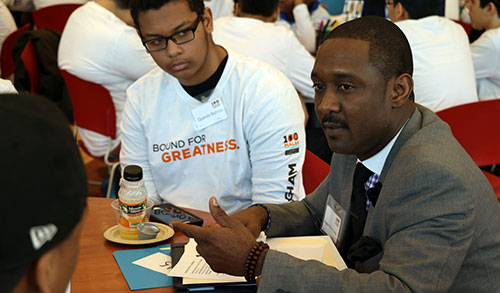
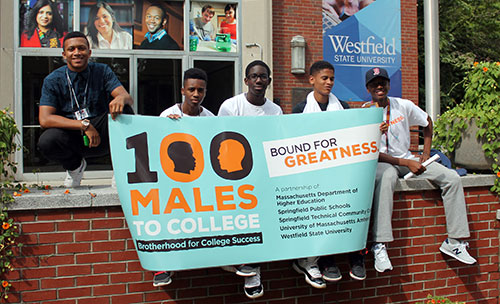
When Framingham High School sophomore Onasis Pena received a written invitation to join the new 100 Males to College program for male students of color, he immediately put the letter in the recycling bin. While most educators are painfully aware of the odds facing students like Onasis, he was nonchalant. “I wasn’t really interested in the letter. I wasn’t going to think about it,” he recalls. “I’m like a C, D student.”
His mother and school counselors intervened, but Onasis’ lukewarm response points to why Framingham State University and MassBay Community College joined forces with two local high schools to help seed the Department of Higher Education’s 100 Males to College program in their community. The program, now operating in Framingham and Springfield with additional pilots being considered by other cities, targets male students who are at the greatest risk of never earning a college degree. The initiative leverages campus and community resources to create a “Brotherhood for Success” through a positive youth development model that embraces culture, identity and community.
At a recent program kickoff at Framingham State, Onasis had lots of company from peers who, like him, couldn’t visualize college as a part of their future. Skilled facilitators encouraged the young men in roundtable discussion groups to think about their personal “brand” in comparison to established commercial brands such as Nike and Apple.
“We want them to connect their personal brand to excellence,” said Sean L. Huddleston, chief diversity and inclusion officer for Framingham State. “We want these young men to see themselves as game changers. The very fact that these young men are enrolling in and graduating from college at much lower rates than every other population makes this a critical program for us to have.”
100 Males to College provides students with “success coaches,” full day and overnight visits to local campuses, a free dual enrollment course, ongoing in-school support, financial aid literacy and college and career planning seminars.
Onasis, who began his 100 Males journey with little sense of direction, is already dreaming of a college major in either engineering (“I’m pretty good at math”) or culinary arts.
100 Males to College students in Springfield have the option of taking their first college classes—and most will be the first in their family to do so. Of the 44 young men who enrolled in three specially designed dual enrollment courses at Springfield Technical Community College (STCC) last fall, 33 earned a grade of C or above, including ten who earned A’s. Five students failed their courses, and one withdrew early.
The grades don’t tell the whole story, however. “I’m optimistic because this is their first crack at something college-level,” says Arlene Rodriguez, vice president for academic affairs at STCC. “These courses are not watered down.”
“They learn how college courses differ from high school courses in regard to content, organization and student responsibilities,” notes STCC Professor Josh Carreiro. “In addition to teaching the course material, I also spend time helping the students acclimate to a college environment.”
And Carreiro is encouraged by a pattern developing among the young men: on their own, they’ve begun to show up on campus well before the start of class in order to hang out with him in the faculty lounge.
“By helping them succeed in the course, I believe the students—especially those on the fence about attending college—will develop a confidence that they can manage college-level work.”
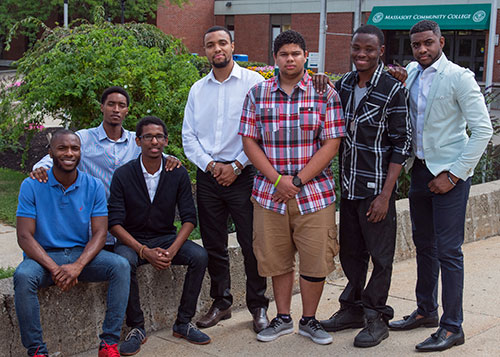
Massasoit and Quinsigamond Community Colleges and Salem State University are three of the public campuses now using support groups to help male students of color build their own communities.
At Massasoit, the new Ubuntu (roughly translated as “Humanity” or “Community” in Zulu) Scholars program fosters a sense of campus community through peer support and male mentorship. At a recent meeting of the group, student Peter Louissaint explained to visitors that hearing about the struggles of his peers had motivated him to work harder in school. His grade point average at Massasoit has shot up from a 2.1 to a 3.4.
“I’ve had to learn the hard way that you can’t do things alone in life,” Louissaint says of his Ubuntu experience. “Rather than be a lone wolf, you have to see there are other people in the room who can help you.”
A community mentor, Brockton Superior Court Judge Richard Chin, nodded approvingly. The first in his family to go to college, Judge Chin now brings court officers to campus to meet the Ubuntu Scholars, “to see young men who are not in handcuffs.”
“For years, I’ve been doing criminal cases, and all I see are young men killing each other. Becoming involved with this program has been rewarding and refreshing.”
Quinsigamond’s Brothers and Keepers male mentoring initiative is credited with helping to improve retention and graduation rates among male students. Of the 23 participants who attended a total of 17 programs and workshops held last year, 20 students either graduated or returned to QCC this year to continue their studies.
At Salem State, members of the Brotherhood for Success meet regularly to give each other academic and social support—and get free haircuts. On a semester basis, four local barbers come to campus and set up shop in a room set aside for them, effectively turning it into a functioning barbershop. Members of the Brotherhood come in not only to have their hair cut but, more importantly, to talk with the barbers, who serve as defacto mentors.
“Members are telling us that their participation in the Brotherhood is the reason they are staying at Salem State,” says director of diversity and multicultural affairs Rebecca Comage. “They say the group gives them a sense of belonging. That sense of community and building shared experiences are among the many key factors, as we all know, that drive college retention.”
The Salem State Brotherhood is cited as one of several reasons for improvements at SSU from fall 2011 to fall 2014:
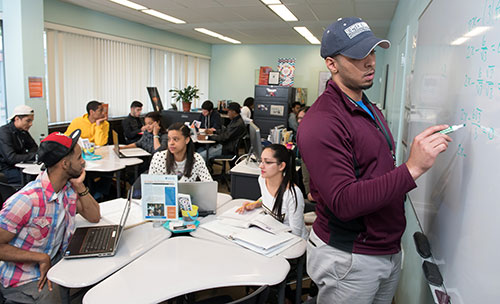
Northern Essex Community College’s Student Success Center (SSC) has received national recognition for its work helping Latino/a students succeed in college. The four-year old Center, established using a Vision Project Performance Incentive Fund grant, won a 2015 Excelencia in Education Award for demonstrating through data and evidence that it had improved the performance of Latino/a students, one of only 20 college programs nationwide to receive such recognition.
Twenty-three percent of NECC’s 2,576 current Latino/a students have used the Success Center’s resources: tutoring, counseling, and career exploration. “It’s very family-oriented; all the ladies who work there are like your moms,” said Carlos Rivera, a NECC student who received academic support at the Center and is now a math tutor himself.
“But it’s not only about tutoring,” adds Rivera. “You tell them what you want to do and they immediately start working for you. I told them I want to be a neurosurgeon and they took me to Dartmouth and to Harvard to see the medical schools.”
Latino/a students using the SSC vs. Latino/a students not using the SSC:
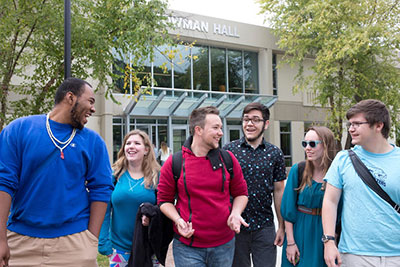
The smallest of the nine state universities, Massachusetts College of Liberal Arts (MCLA) has used intentional recruitment strategies to boost the percentages of African American and Latino/a students at its Berkshire campus. Enrollment gaps have declined, while the graduation rate gaps are significantly smaller at MCLA than for the state university segment as a whole.
The college credits its success to partnerships with community-based organizations, outreach to diverse communities, and support of students as they transition to college life.